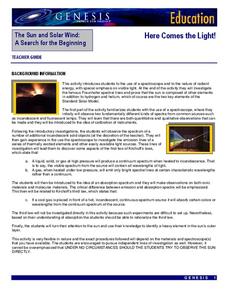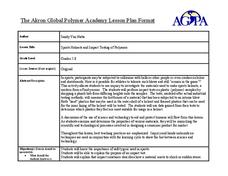NASA
Here Comes the Light!
Look beyond the light! An engaging activity introduces young scholars to the application of a spectroscope. The lesson is the fifth in a series of six and focuses on the analysis of the elements of the sun.
Rice University
College Physics for AP® Courses
Take a look at an organized physics course. The 34-section electronic textbook covers material in AP® Physics 1 and 2. Teachers use the text to supplement lectures and have the class work through the labs. Each section contains multiple...
Curated OER
Properties of Materials - Part B
Students describe the history of materials. They use the kinetic (particle) theory to explain changes of state in matter and trace the flow of heat during changes of state and chemical changes.
Curated OER
Properties of Matter
High schoolers describe four states of matter and their characteristics, explain thermal expansion of matter, interpret state changes in terms of kinetic theory of matter, explain relationship between temperature and volume of a gas,...
Curated OER
A Comparison of Land and Water Temperature
Students use the NASA website's Live Access Server to create a graph of surface temperature at two locations on earth. They analyze the data and then answer specific questions provided in this lesson. They also examine and compare the...
Curated OER
Endothermic or Exothermic That Is the Question
Students conduct an experiment to determine what happens to heat energy during a chemical reaction. They examine an endothermic reaction by observing a chemical reactions.
Curated OER
The Great Ocean Conveyor
Learners investigate water density. In this water density lesson plan, students conduct an experiment with food coloring, water and salt to see how the salt effects bodies of water.
Curated OER
Hess's Law
In this reactions worksheet, students use Hess's Law to calculate the heat gained or lost by different reactions. Students determine if the reaction would occur spontaneously at a given temperature. This worksheet has 9 problems to solve.
Curated OER
More on Conduction and Convection
Why do some items feel colder when they are the same temperature? How should you keep your soda cold? What makes the wind blow? These are just some of the things middle schoolers discover when completing a lesson on conduction and...
Curated OER
A Comparison of Land and Water Temperature
Young scholars examine NASA satellite observations of surface temperature and investigate the seasonal changes of land and water temperature.
Curated OER
State Change
Eighth graders explore the physical change of matter. As a class, they discuss their favorite super hero and determine if the hero undergoes a physical or chemical change. Students examine the change of state and phase change. In groups,...
Discovery Education
Cushion It!
Sugar cubes, collide! Groups design protection systems using bubble wrap to protect sugar cubes from being destroyed by falling batteries in the STEM lesson. They consider how the experiment relates to collisions in real-world...
International Technology Education Association
Pixel This!
Did the image I drew match the image you saw? By simulating a satellite and a ground station, teams of two transmit data in the form of pixels in order to recreate an image. They use four different levels of brightness, creating slightly...
Curated OER
Evaporation and Condensation
Students explore how temperature affects the processes of evaporation and condensation.
Curated OER
Simplicity of Electricity
Students examine how to make an electrical circuit. They listen to a teacher led discussion, design a switch to control a circuit, and construct a signaling device.
Curated OER
Sports Helmets and Impact Testing of Polymers
Students examine the importance of good quality safety gear. In this investigative lesson plan, students will tests various polymers, collect data, and analyze the data to determine which polymer is best for safety helmets. They will...
Curated OER
Compact Fluorescent Lamp Experiments
Young scholars conduct a series of experiment on incandescent and fluorescent bulbs. In this physics lesson, students explain how they operate. They compare the efficiency and power rating of both bulbs.
Curated OER
Evaporation and Condensation
Students explore how temperature effects the processes of evaporation and condensation and how the air may be polluted by the evaporation of certain compounds. In this temperature lesson students complete a lab and a worksheet.
Curated OER
Science Word Search
In this science learning exercise, students look for the words that are related to the theme of the sheet in the word search. They also work on spelling skills.
Curated OER
Effects and Applications of Nuclear Chemistry
In this nuclear chemistry worksheet, students determine the biological effects and the applications of nuclear chemistry. Then students use Einstein's theory of special relativity to complete 3 problems.
Curated OER
Hot Air Balloon
Students view a video and discuss the mechanics of a hot air balloon. They, in groups, construct a functioning hot air balloon.
Curated OER
Biodiesel Combustion and Its Influences in NOx Emissions
Tenth graders evaluate the physical mechanisms that cause a change in NOx emissions. In this combustion lesson, 10th graders participate in a research project. Students create a presentation of their findings.
Curated OER
and and Ocean Views of Earth by Remote Sensing
Students explain how satellites help scientists to see more than with the unaided eye and how Landsat technology works. Students identify vegetation and fire sites in the rainforest and detect erosion along rivers. They are able to use...
Curated OER
WHY DO SOME THINGS FLOAT WHILE OTHERS SINK
Students explore how density can cause things to sink or float by experimenting with a jar, oil and corn syrup.

























